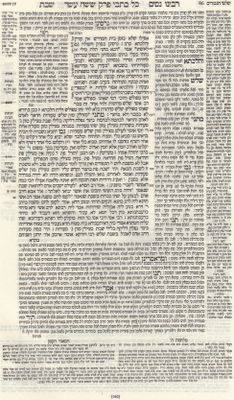
HIDE/SHOW IMAGE
43b
{Shabbat 116b continues}
We may not read them [on the Sabbath] even when it is not the time of the Beth Hamidrash.
And the halacha is like Rav.
We learn in perek hasholeach get leIshto {Gittin 38b}:
Rava {our gemara: Rabba} said: For these three offences men become impoverished: for emancipating their [heathen] slaves, for inspecting their property on Shabbat, and for taking their main Sabbath meal at the hour when the discourse is given in the Beth Hamidrash.
For Rabbi Chiyya bar Abba cited Rabbi Yochanan: there were two families in Jerusalem, one of which used to take its main meal on Shabbath [at the hour of the discourse] and the other on the eve of Sabbath {Friday night rather than the daytime meal}, and both of them became extinct.
And the halacha is that it is forbidden to read sifrei hedyotot {secular documents} on Shabbat.
{Rashi, Ran: such as those of calculations or letters of messengers limtzo chefetz {lit. to find items}. The Ran adds: for we must fear lest he erase. This seems to equate them with shtarei hedyotot, mentioned on Shabbat 159a, forbidden for the same reason.}
{Shabbat 117a}
"AND WHITHER MAY WE RESCUE THEM?...":
Howso an open alley, and howso a closed one?
{Shabbat 117b}
Rav Ashi said: Three walls and one stake {lechi}, that is a closed alley; three walls without a stake, that is an open alley.
And the halacha is not like Ben Beteira, not in an alley and not in a courtyard.
{but rather, the rule is: into a closed alley}.
MISHNA:
FOOD FOR THREE MEALS MAY BE SAVED, THAT WHICH IS FIT FOR MAN, FOR MAN, THAT WHICH IS FIT FOR ANIMALS, FOR ANIMALS.
HOW SO?
IF A FIRE BREAKS OUT SHABBAT NIGHT {=Friday night}, FOOD FOR THREE MEALS MAY BE SAVED;
[IF] IN THE MORNING, FOOD FOR TWO MEALS MAY BE SAVED;
AT [THE TIME OF] MINHAH, FOOD FOR ONE MEAL.
R. JOSE SAID: AT ALL TIMES WE MAY SAVE FOOD FOR THREE MEALS
Gemara:
They learnt {in a brayta}: If one's barrel {of wine} is broken on the top of his roof he may bring a vessel and place {it} underneath, provided that he does not bring another vessel and catch {the dripping liquid}, or another vessel and join it {to the roof}. If guests happen to visit him, he may bring another vessel and catch {the dripping liquid}, or another vessel and join it {to the roof}. He must not catch {the liquid} and then invite {the guests}, but must first invite {them} and then catch {the liquid}; and one must not evade the law in this matter {by inviting guests as a pretense}.
The Sages learnt {in a brayta}: If he saved bread [made] of fine flour, he must not save coarse bread; [if he saved] coarse bread, he may [still] save a fine [flour] bread. And one may save on Yom Kippur for Shabbat, but not on Shabbat for Yom Kippur, and it need not be said, from Shabbat to Yom Tov {it is forbidden}, and not from this Shabbat to the next Shabbat.
The Sages learnt {in a brayta}: If one forgets a loaf in an oven, and the day becomes holy upon him {=it becomes Shabbat}, food for three meals may be saved, and he may say to others, 'Come and save for yourselves.' And when he removes [the bread], he must not remove it with a mardeh but with a knife. And even though this removing is a chochma {art} and not a melacha {labor} as much as is possible to vary it we vary.
Rav Chisda said: One should always make early [preparations] {on Friday} against the termination of Shabbat {=motzaei Shabbat}, for it is said {Shemot 16:5}:
immediately.
Rabbi Abba said: On Shabbat it is one's duty to break bread over two loaves, for it is written {Shemot 16:22}:
Shemot 16:22}:
Rabbi Zera broke enough bread for the whole meal.
Ravina said to R. Ashi: But that looks like greed?
Since he does not do this every day, but only now [Shabbat], it does not look like greed.
Rabbi Ammi and Rabbi Assi, when they came across the bread of an eruv, would commence {their meal} therewith, observing, 'Since one precept has been performed with it, let another precept be performed with it.'
"HOW SO? IF A FIRE BREAKS OUT SHABBAT NIGHT {=Friday night}, FOOD FOR THREE MEALS MAY BE SAVED":
The Sages learnt {in a brayta}: How many meals must one eat on Shabbat? Three. Rabbi Chidka says: Four.
Rabbi Yochanan said: And both of them derive it from the same pasuk.



No comments:
Post a Comment